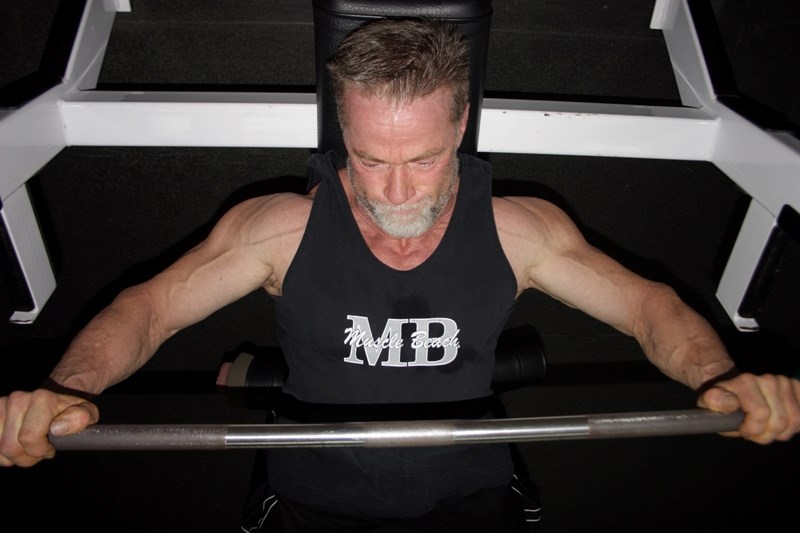It’s fairly common for people to pick up a new hobby once they turn 50. It’s less common for that hobby to be bodybuilding and it’s downright rare to take that hobby and compete at the national level.
For Westlock resident Emmett Kyler, however, that’s exactly how it happened. “I never lifted weights until I turned 50,” he said. “My whole life has changed.”
After just seven years in the sport, he is consistently finishing in the Top 5 in the country and he credits his success to a keen mental focus that he honed through decades of martial arts training.
Kyler is fresh off a fourth-place finish in the Grandmasters 50-plus at the 2011 Canadian Bodybuilding Championships in Laval, Que. on Oct. 9, and he is no stranger to Top 5 finishes at the national competition. He finished in third place in 2006, 2009 and 2010.
“If you’re willing to commit your mind, that’s what you get,” he said.
Kyler added he is one of the only top-level bodybuilders in the country who works out of a small gym without a personal trainer. He does the bulk of his weight training at the Westlock Recreation Centre.
He got his start, in part, because a shoulder injury he suffered while playing hockey. At the same time, his son was getting involved in bodybuilding and suggested weight training could be a good way to recover from his injury.
“He said, ‘Dad, go to the gym, take your time, and start fixing up that shoulder,’” Kyler said. “Then I got hooked; that’s how I got into competition.”
While the mention of bodybuilding will, for most people, conjure up a mental image of a young Arnold Schwarzenegger, Kyler emphasized that bodybuilding means different things to different people, but the one unifying principle is the importance of mental focus. In fact, the sport is actually more about mind than body.
The routine leading up to a competition is incredibly rigorous with respect to exercise, diet and practice posing. Furthermore, it starts several months before any competition.
He outlined his training plan for the 2012 Canadian Bodybuilding Championships, which are scheduled for Aug. 18 in Edmonton.
Kyler often takes a bit of time off after a competition to take a break from working out and just eat whatever he wants.
His diet will begin in earnest in January, when he cuts out fats and sugars. Then, about 16 weeks before the competition, it gets more stringent.
“In April, I will start cutting carbs but the meat, the protein, that all stays the same,” he said.
Cutting out the carbohydrates coincides with increasing the intensity of his workouts, with three distinct workouts each day: one for weight training, one for fat burning and one to practice his stage routine.
“That’s the absolute hardest, the stage routine and the posing,” he said.
During this time, he also increases his water intake to between six and 10 litres per day. In the last week leading up to the competition, that amount increases to between 10 and 15 litres per day. The day before the competition, he stops drinking water at noon. Then at 6 p.m., there is the official weigh-in.
“Then, I get to go out and have the meal of a lifetime,” he said.
Typically, this will include a 14 oz. steak with potatoes and french fries. This is all washed down with ketchup, because he still won’t drink water until the competition is finished.
“I want to shrink-wrap my skin,” he said. “That’s what the no water does.”
Kyler hits the sack around 11 p.m., wakes at 3 a.m. for a quick snack then goes to back to sleep before finally rising at 7 a.m. on competition day. From then on, it’s all about mental focus.
“The mental concentration to flex the right muscles for the right pose, that’s the hardest thing I’ve done in my whole life.”
After the daytime show, the Top 5 competitors in each category are given one minute with the stage to themselves in the evening show.
“It doesn’t matter — it’s not for the judges it’s for the fans,” Kyler said.
Once the day is done, often at about 11 p.m., he can relax. The best part of the sport, however, is the camaraderie that comes with it. Although each athlete is there to compete, they are usually quite respectful and friendly with each other.
“When I do the Grand Masters competition, there will be 20 guys there and I know all of them,” Kyler said. “Everybody is on this caring, understanding, loving level.”
Ultimately, he said he takes part in the sport simply to satisfy a personal drive. He set a goal for himself, and continues to work toward achieving it.
“I get so excited thinking about it,” he said. “It’s turned my whole life around.”



